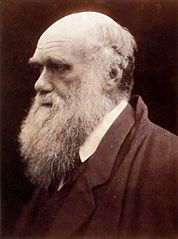International Darwin Day: Back to the Future – The Continued Descent of Humans

Charles Darwin photographed by Julia Margaret Cameron, September 1868
Not many ideas in Western culture have generated as much enlightenment and simultaneous division as the concepts Charles Darwin outlined in On The Origin of Species and The Descent of Man. The idea that variation and natural selection drive evolution is the main reason people get flu shots every year or need ramped up antibiotics for recurring infections. Pretty simple stuff really. The division sometimes is revealed during discussions about evolution with citizens that have a difficult time wrapping their head around the deeper details of genetics, geologic time and other related scientific concepts. Maybe the flu shot or antibiotic examples could be softer lead ins for those types of conversations. Or perhaps, highlighting the importance of variation in evolution could help smooth over tensions during discussions on diversity in the Earth and space Sciences. Whatever the case, conversations (like the hypothetical ones above) usually become sticky when the relationship between the discussants is strained or non-existent. Case in point, I am able to freely introduce scientific concepts into spiritual discussions at my church because of the relationship I have with the membership. Relationship is the goal. Being sympathetic to other’s perspectives and experiences is the work it takes to get there.
Darwin’s On The Origin of Species (Species) discusses how the diversity we see in life is a result of continued descent through natural selection… biological evolution. The book also indirectly introduces a tough truth in natural law. And that truth is that when the environment changes, species only have three options: adapt, migrate or become extinct. Over a decade later, in The Descent of Man (Descent), Darwin logically applies his Species concepts to human evolution. Controversially game changing! And so, we take time each year to remember and celebrate, in various ways, the contribution of Darwin’s groundbreaking revelations to science… including the social sciences! I mean, how can one discuss human evolution and continued descent if one does not include elements of how humans relate to one another and their environment. Yet somehow, in the early years of the 21st Century, people still find it difficult to bridge the discussion gap between the “traditional” and “social” sciences. But guess who I discovered did not have a problem with bridging the gap? That’s right, our celebrant, Darwin himself.
In the last chapter of Descent, Darwin discusses everything from language, culture, and religious beliefs to human characteristics like morals and sympathy. These last two characteristics seem to resonate more heavily than others with Darwin. He goes so far as to say that “as” sympathy and morality are “highly beneficial to the species, they have in all probability been acquired through natural selection.” From what I can gather, he argues that morality and sympathy are so important for species survival that they are actually selected for. Whoa! He clarifies later, that social instincts (like sympathy) create the “basis for the development of the moral sense.” He goes on to mention that morality is something that distinguishes humans from lower animals and that sympathy, “though gained as an instinct, is also much strengthened by exercise or habit.” There is quite a bit of serious social commentary from Darwin in those last pages of Descent and it is just as groundbreaking as the concepts of variation and natural selection.
As a species, humans are not exempt from nature’s three options. We only have one planet, so migration is out of the question. What’s left as our choices are adaptation or extinction. To put it bluntly, in today’s human discourse full of news cycles, tweets, posts, spin, ideology, and everything else, which option are we choosing? We should all do ourselves a favor and unplug from the world’s systems just long enough to meditate on Darwin’s words about sympathy and morality. Recognizing that those traits should be selected for species survival. And then, right before we plug back in, remember that we are on this planet together to descend only in an evolutionary sense.
Read AGU’s Position Statement “The Scientific Theories of Biological Evolution and History of the Earth Should be Central Elements of Science Education“



There are no comments
Add yours